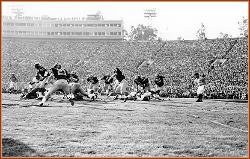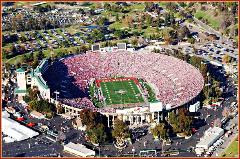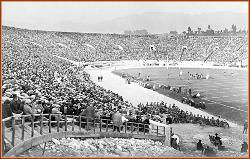



Boston College Alumni Stadium
Alumni Stadium is a football stadium located on the campus of Boston College in
Chestnut Hill, Massachusetts, approximately two miles west of Boston. It is the home of
the Boston College Eagles. Its present seating capacity is 44,500.
History
Opened in 1915 as "Alumni Field," Boston College's first stadium was located just south
of Gasson Quadrangle, on the site of the present "Campus Green", better known as the
"Dustbowl." While today that area of BC's campus is grass-covered and landscaped,
the Dustbowl nickname originated as a description of Alumni Field in the years when it
was intensely-used not only as a gridiron, but a practice field, a baseball diamond and a
running track. Formally dedicated "as a memorial to the boys that were" on October 30,
1915, Alumni Field and its distinctive "maroon goal-posts on a field of green" were
hailed in that evening's edition of the Boston Saturday Evening Transcript as "one of
the sights in Boston." The original grandstands, which could accommodate 2,200
spectators in 1915, were enlarged over the subsequent years such that a 1941 concert
band drew a record crowd of 25,000. Nonetheless Alumni Field often proved too small
for BC football games which were frequently held at Fenway Park, and later Braves
Field, beginning in the 1930s and 1940s.
On September 21, 1957 Alumni Stadium opened on Boston College's lower campus.
The new stadium incorporated a football field encircled by a regulation track with a
seating capacity of 26,000. The dedication game, a match up with the Midshipmen of
the U.S. Naval Academy, was orchestrated with the help of BC benefactor and
then-Massachusetts Senator John F. Kennedy. Kennedy, who had received his
honorary degree at Commencement Exercises in Alumni Field the previous year, would
return to Alumni Stadium on a number of occasions over the course of his political
career, including a 1963 Convocation Address, one of his last public appearances.
Alumni Stadium has hosted numerous intellectual and cultural luminaries, religious
leaders and heads of state as the venue for Boston College's annual Commencement
Exercises since 1957.
In addition to being the permanent home of the Boston College football team, Alumni
Stadium hosted the Boston Patriots of the American Football League during the 1969
season. The stadium underwent a major renovation before the 1994 season which
eliminated the track and increased seating capacity to 44,500. Since 1998, a
65-foot-high bubble of inflatable vinyl has covered the stadium from December to March
and allowed the field to be used as a winter practice facility. The field surface itself was
converted to FieldTurf before the 2004 season. In the summer before the 2005 football
season, the $27 million Yawkey Athletics Center opened at Alumni Stadium's north end
zone, and the ACC logo of the Atlantic Coast Conference was added to the FieldTurf
surface.
As the home of the Boston College Eagles, Alumni Stadium has been the site of
numerous notable moments in Boston College football history. On September 17, 2005,
Alumni Stadium hosted BC's inaugural game as a member of the Atlantic Coast
Conference.
Boston College Football
Football at Boston College can be traced to the 1884 founding of the "Boston College
Athletic Club" and the first series of interclass games held on the James Street Fields in
Boston's South End. In 1892, President Edward Devit, SJ, grudgingly agreed to the
requests of two undergraduates, Joseph F. O'Connell of the class of 1893 and Joseph
Drum of the class of 1894, to start a varsity football team. Drum would become the first
head coach, albeit an unpaid position and O'Connell was captain. On October 26,
1893, BC played its first official game against the St. John's Literary Institute of
Cambridge followed by its first intercollegiate game against MIT. BC won the first game
4-0, but lost 6-0 to MIT. Two of the original team's alumni had particularly significant
careers: Lineman John Douglass became the first BC graduate to be elected to the U.S.
House of Representatives and running back James Carlin became president of Holy
Cross, a nearby Jesuit college in Worcester, Massachusetts.
In addition to success on the gridiron, Boston College football has achieved success in
the classroom. In 2006, Eagle football had an NCAA APR score of 982, placing them in
the 90th-100th percentile nationally. The football team's APR was the highest of any
school that finished the 2005 season ranked in the ESPN/USA Today Coaches' Poll.
Move to the ACC
On July 1, 2005, Boston College moved from the Big East to the Atlantic Coast
Conference.
In 2003 the ACC announced plans to expand from nine teams to twelve. Miami,
Syracuse, and Boston College were rumored to be the three schools under
consideration, and all three met with officials from the ACC regarding membership. It
was later revealed that Miami had been dissatisfied with the Big East and its leadership
since a formal letter of complaint was issued by them to Big East Commissioner Mike
Tranghese several years prior in 1999. Their issues went unresolved, leading to
Miami's interest in the ACC - a league who had been pursuing the college football
superpower since the mid-1990s, at the request of neighboring football schools Florida
State, Clemson and Georgia Tech.
In an unexpected turn, due in large measure to political pressure applied by Governor
Mark Warner of Virginia, the ACC replaced Syracuse with Virginia Tech in its expansion
vote. Things became even more surprising when, reached by phone at a conference in
Switzerland, then-N.C. State Chancellor Marye Anne Fox cast a shocking last-minute
"no" vote against Boston College. As a result, the ACC extended invitations only to
Miami and Virginia Tech. Virginia Tech immediately accepted the invitation and filed
court papers to get themselves out of the awkward position of suing their new
conference. The remaining four plaintiffs removed Boston College from the list of
defendants and asked both BC and Syracuse to join their suit. Boston College and
Syracuse declined.
Boston College has kept some of their rivals from the Big East. An eight-year deal to
play Syracuse in football starting in 2010 has been signed, and a four-year deal to play
Providence College in basketball begins in the 2006-7 school year.



Alumni Field, the future home of Alumni Stadium.
|









